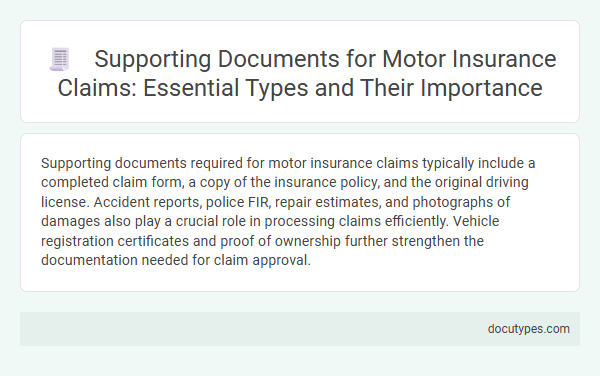Supporting documents required for motor insurance claims typically include a completed claim form, a copy of the insurance policy, and the original driving license. Accident reports, police FIR, repair estimates, and photographs of damages also play a crucial role in processing claims efficiently. Vehicle registration certificates and proof of ownership further strengthen the documentation needed for claim approval.
Introduction to Supporting Documents for Motor Insurance Claims
Supporting documents are essential for processing motor insurance claims efficiently. These documents provide proof of the incident, vehicle details, and ownership, ensuring accurate assessment and timely settlement. Understanding the required paperwork helps you prepare and submit a complete claim without delays.
Why Supporting Documents Matter in Motor Insurance
What types of supporting documents are needed for motor insurance claims? Motor insurance claims often require documents like the insurance policy, accident report, and vehicle damage photos. These materials help verify the claim and speed up the settlement process.
Why do supporting documents matter in motor insurance claims? Supporting documents provide essential proof to validate the claim's authenticity and ensure fair compensation. Submitting accurate documents protects your interests and reduces the risk of claim rejection.
Policy Document: Proof of Insurance Coverage
Submitting a motor insurance claim requires specific supporting documents to verify the incident and coverage. The policy document serves as crucial proof of insurance coverage during the claims process.
- Policy Document - It confirms the existence and validity of the motor insurance contract between the insured and the insurer.
- Proof of Coverage - Demonstrates the insured vehicle's protection under the policy terms at the time of the claim.
- Essential Reference - Provides detailed information about policy limits, deductibles, and coverage types applicable to the claim.
Ensuring the policy document is complete and up-to-date speeds up the evaluation and settlement of motor insurance claims.
Claim Form: The Foundation of Your Request
The claim form is the essential document that initiates the motor insurance claims process. It captures all necessary details about the incident, the policyholder, and the vehicle involved.
Accurate completion of the claim form ensures the insurer has a clear understanding of the claim circumstances. This foundation enables faster processing and helps avoid delays or rejections.
Vehicle Registration Certificate (RC)
The Vehicle Registration Certificate (RC) is a crucial document required for motor insurance claims. It serves as proof of ownership and verifies the vehicle's details, such as make, model, and registration number. Providing the RC expedites the claim process by ensuring accurate identification of the insured vehicle.
Driver’s License of the Involved Driver
For motor insurance claims, the driver's license of the involved driver is a crucial supporting document. It serves as proof of the driver's legal authorization to operate the vehicle.
The insurance company requires a valid driver's license to verify the identity and driving credentials of the claimant. This document helps establish the legitimacy of the claim and determines coverage eligibility. Failure to provide a valid driver's license can result in claim delays or denial.
First Information Report (FIR) or Police Report
Submitting a First Information Report (FIR) or Police Report is essential when filing a motor insurance claim to establish the incident's authenticity. These documents provide official evidence required by insurers to process your claim efficiently.
- First Information Report (FIR) - A formal complaint filed with the police immediately after an accident, detailing the event's circumstances.
- Police Investigation Report - An official document summarizing the police's findings after examining the accident scene and involved parties.
- Copy of FIR Acknowledgment - Proof that the police have registered your complaint, which insurers require to verify the claim's legitimacy.
Repair Estimates and Invoices
Repair estimates and invoices are essential supporting documents for motor insurance claims. They provide clear evidence of damages and repair costs to facilitate claim processing.
- Repair Estimates - Detailed cost projections from authorized garages outlining the expected expenses for repairing the vehicle.
- Invoices - Official bills confirming the completion of repairs and the amount paid for parts and labor.
- Accuracy of Documents - Precise and itemized documents help prevent claim delays and ensure proper reimbursement.
Photographic Evidence of the Damage
| Type of Supporting Document | Description | Importance for Motor Insurance Claims |
|---|---|---|
| Photographic Evidence of the Damage | Clear, detailed photos capturing the exact condition of the vehicle damage, including close-ups of dents, scratches, broken parts, and the surrounding accident scene. | Serves as crucial proof for the insurance adjuster to assess the claim's validity and extent of the damage. Accurate photographs help expedite claim processing and facilitate fair settlements. |
| Police Report | Official documentation from law enforcement detailing the accident circumstances. | Verifies the legitimacy of the incident and complements photographic evidence to support claim approval. |
| Repair Estimates | Cost evaluations from authorized garages or service centers outlining vehicle repair expenses. | Helps insurers determine claim amounts and validate the necessity of repairs based on photographed damages. |
| Insurance Policy Documents | Complete set of your motor insurance policy papers including coverage details and claim procedures. | Ensures that the claim is filed within the policy scope and provides reference for damage eligibility assessment. |
What Types of Supporting Documents Are Needed for Motor Insurance Claims? Infographic

